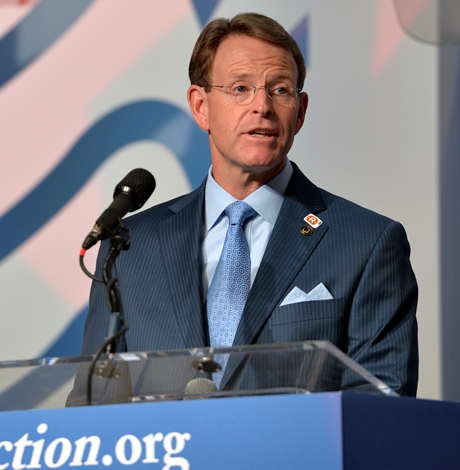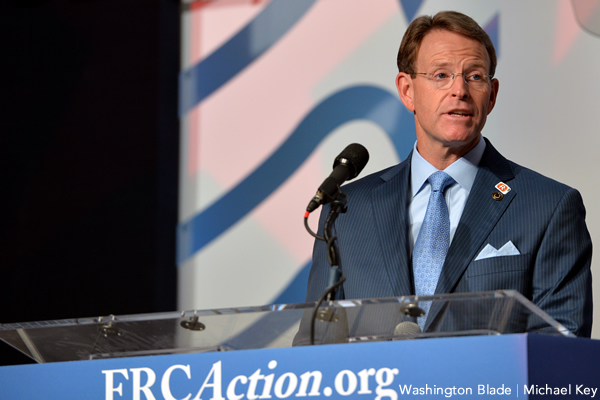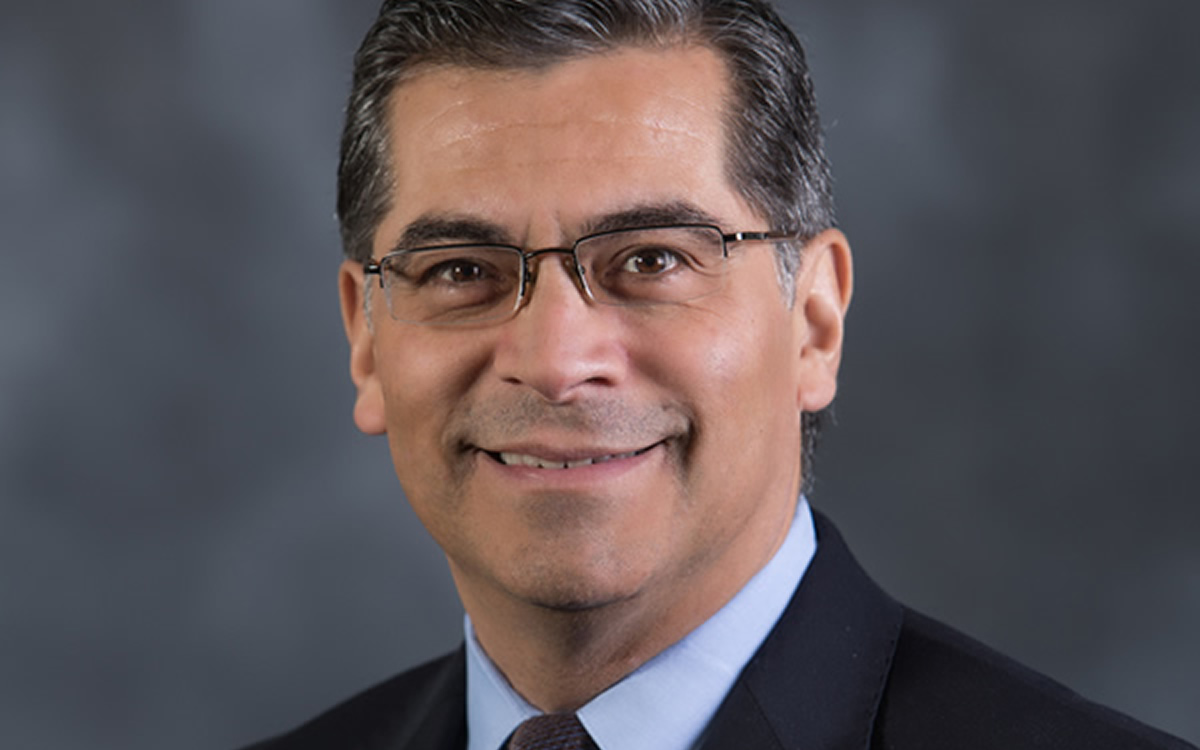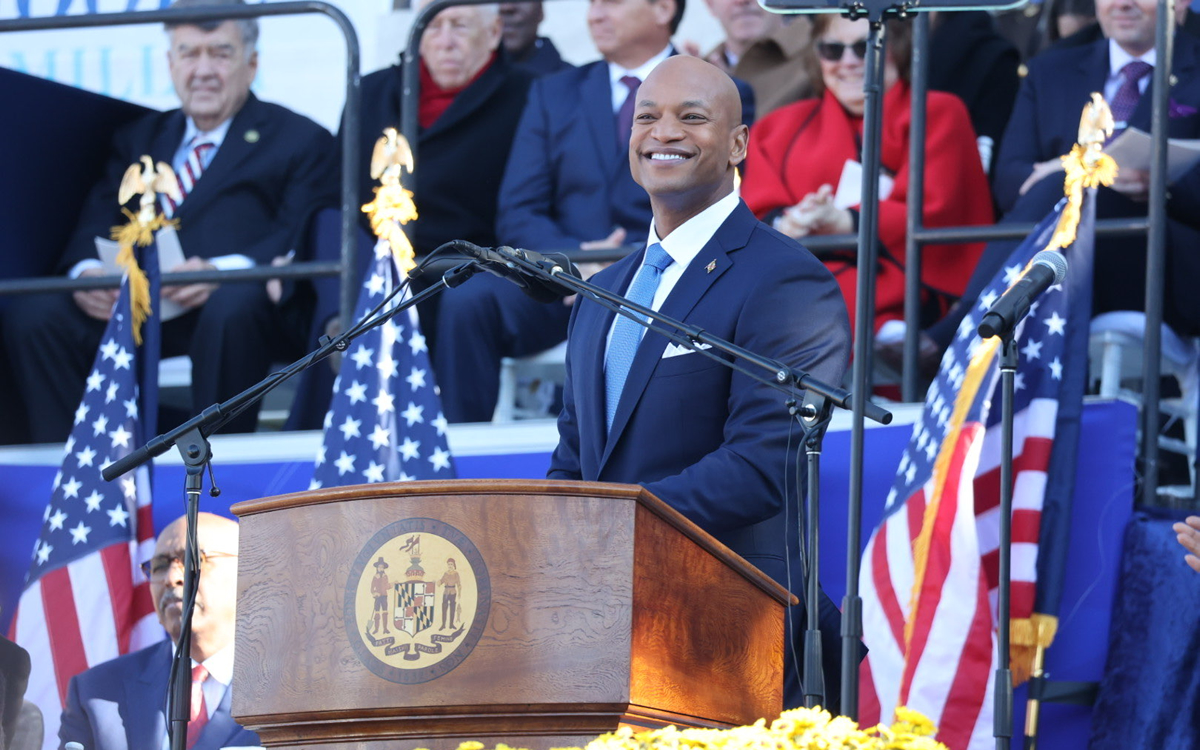News
Tony Perkins: More action from Trump soon on ‘religious freedom’
Anti-LGBT leader says follow-up to executive order coming next week


Family Research Council President Tony Perkins says more action on “religious freedom” is coming next week. (Washington Blade file photo by Michael Key)
In the aftermath of a religious freedom executive order signed by President Trump that had no explicit reference to LGBT issues, the head of a top anti-LGBT group close to the White House said more action is coming next week on the issue — code for social conservatives to mean anti-LGBT discrimination.
Tony Perkins, president of the Family Research Council, made the remarks last night on “Washington Watch” the weekly radio broadcast produced by the organization.
“By the way, stand by next week, you’re going to see some follow-up to the president’s executive order on religious liberty,” Perkins said. “The next phase of that is going to be coming about and I think it is going to be very instructive. We are going to see government agencies basically put on notice that they have to respect religious freedom. And that is not just the ability to believe, it is the free exercise of religion.”
It’s unclear exactly what Perkins was referencing. Earlier this year, a draft executive order on “religious freedom” that would have enabled sweeping anti-LGBT discrimination circulated among federal agencies and advocacy groups, although Trump never signed the order.
Instead, Trump in May signed a religious freedom executive order that was largely a symbolic statement in favor of the U.S. Supreme Court’s Hobby Lobby decision and against the Johnson Amendment, a 1954 law barring churches and religious non-profits from making political endorsements.
The directive made no explicit reference to LGBT issues, although it charged U.S. Attorney General Jeff Sessions with implementing federal guidance in favor of religious freedom. That language alarmed some LGBT groups like the Human Rights Campaign, who said it opened the door for discrimination.
At a conference earlier this month, for the anti-LGBT Alliance Defending Freedom, Sessions said guidance for “religious freedom” is on the way.
Although he didn’t offer details, the attorney general said it would “help agencies follow the Religious Freedom Restoration Act.” That law, which prohibits the government from substantially burdening a person’s exercise of religion, was passed in 1993 on a bipartisan basis, but has been cited as legal basis for allowing anti-LGBT discrimination.
“Congress enacted RFRA so that, if the federal government imposes a burden on somebody’s religious practice, it had better have a compelling reason,” Sessions said. “That is a demanding standard, and it’s the law of the land. We will follow it just as faithfully as we follow every other federal law. If we’re going to ensure that religious liberty is adequately protected and our country remains free, then we must ensure that RFRA is followed.”
Sarah Kate Ellis, CEO of GLAAD, distributed the audio of Perkins predicting action on “religious freedom” and warned Trump against following through with discrimination.
“If President Trump issues another executive order based on advice from anti-LGBTQ extremist groups like the Family Research Council, he will be harming countless hardworking Americans and their families,” Ellis said in a statement. “The ‘religious exemptions’ laws that groups like the Family Research Council are successfully pushing fly in the face of real American values and open LGBTQ people and our children up to discrimination.”
Federal Government
HHS reverses Trump-era anti-LGBTQ rule
Section 1557 of the Affordable Care Act now protects LGBTQ people

The U.S. Department of Health and Human Services Office for Civil Rights has issued a final rule on Friday under Section 1557 of the Affordable Care Act advancing protections against discrimination in health care prohibiting discrimination on the basis of race, color, national origin, age, disability, or sex (including pregnancy, sexual orientation, gender identity, and sex characteristics), in covered health programs or activities.
The updated rule does not force medical professionals to provide certain types of health care, but rather ensures nondiscrimination protections so that providers cannot turn away patients based on individual characteristics such as being lesbian, gay, bisexual, transgender, queer, intersex, or pregnant.
“This rule ensures that people nationwide can access health care free from discrimination,” said HHS Secretary Xavier Becerra. “Standing with communities in need is critical, particularly given increased attacks on women, trans youth, and health care providers. Health care should be a right not dependent on looks, location, love, language, or the type of care someone needs.”
The new rule restores and clarifies important regulatory protections for LGBTQ people and other vulnerable populations under Section 1557, also known as the health care nondiscrimination law, that were previously rescinded by the Trump administration.
“Healthcare is a fundamental human right. The rule released today restores critical regulatory nondiscrimination protections for those who need them most and ensures a legally proper reading of the Affordable Care Act’s healthcare nondiscrimination law,” said Omar Gonzalez-Pagan, counsel and health care strategist for Lambda Legal.
“The Biden administration today reversed the harmful, discriminatory, and unlawful effort by the previous administration to eliminate critical regulatory protections for LGBTQ+ people and other vulnerable populations, such as people with limited English proficiency, by carving them out from the rule and limiting the scope of entities to which the rule applied,” Gonzalez-Pagan added. “The rule released today has reinstated many of these important protections, as well as clarifying the broad, intended scope of the rule to cover all health programs and activities and health insurers receiving federal funds. While we evaluate the new rule in detail, it is important to highlight that this rule will help members of the LGBTQ+ community — especially transgender people, non-English speakers, immigrants, people of color, and people living with disabilities — to access the care they need and deserve, saving lives and making sure healthcare professionals serve patients with essential care no matter who they are.”
In addition to rescinding critical regulatory protections for LGBTQ people, the Trump administration’s rule also limited the remedies available to people who face health disparities, limited access to health care for people with Limited English Proficiency, and dramatically reduced the number of healthcare entities and health plans subject to the rule.
Lambda Legal, along with a broad coalition of LGBTQ advocacy groups, filed a lawsuit challenging the Trump administration rule, Whitman-Walker Clinic v. HHS, and secured a preliminary injunction preventing key aspects of the Trump rule from taking effect.
These included the elimination of regulatory protections for LGBTQ people and the unlawful expansion of religious exemptions, which the new rule corrects. The preliminary injunction in Whitman-Walker Clinic v. HHS remains in place. Any next steps in the case will be determined at a later time, after a fulsome review of the new rule.
GLAAD President Sarah Kate Ellis released the following statement in response to the news:
“The Biden administration’s updates to rules regarding Section 1557 of the ACA will ensure that no one who is LGBTQI or pregnant can face discrimination in accessing essential health care. This reversal of Trump-era discriminatory rules that sought to single out Americans based on who they are and make it difficult or impossible for them to access necessary medical care will have a direct, positive impact on the day to day lives of millions of people. Today’s move marks the 334th action from the Biden-Harris White House in support of LGBTQ people. Health care is a human right that should be accessible to all Americans equally without unfair and discriminatory restrictions. LGBTQ Americans are grateful for this step forward to combat discrimination in health care so no one is barred from lifesaving treatment.”

Maryland Gov. Wes Moore on Thursday signed a bill that seeks to combat efforts to ban books from state libraries.
House Bill 785, also known as the Freedom to Read Act, would establish a state policy “that local school systems operate their school library media programs consistent with certain standards; requiring each local school system to develop a policy and procedures to review objections to materials in a school library media program; prohibiting a county board of education from dismissing, demoting, suspending, disciplining, reassigning, transferring, or otherwise retaliating against certain school library media program personnel for performing their job duties consistent with certain standards.”
Moore on Thursday also signed House Bill 1386, which GLSEN notes will “develop guidelines for an anti-bias training program for school employees.”

The Mexican Senate on Thursday approved a bill that would ban so-called conversion therapy in the country.
Yaaj México, a Mexican LGBTQ rights group, on X noted the measure passed by a 77-4 vote margin with 15 abstentions. The Chamber of Deputies, the lower house of Mexico’s congress, approved the bill last month that, among other things, would subject conversion therapy practitioners to between two and six years in prison and fines.
The Senate on its X account described conversion therapy as “practices that have incentivized the violation of human rights of the LGBTTTIQ+ community.”
“The Senate moved (to) sanction therapies that impede or annul a person’s orientation or gender identity,” it said. “There are aggravating factors when the practices are done to minors, older adults and people with disabilities.”
Mexico City and the states of Oaxaca, Quintana Roo, Jalisco and Sonora are among the Mexican jurisdictions that have banned the discredited practice.
The Senate in 2022 passed a conversion therapy ban bill, but the House of Deputies did not approve it. It is not immediately clear whether President Andrés Manuel López Obrador supports the ban.
Canada, Brazil, Belgium, Germany, France, and New Zealand are among the countries that ban conversion therapy. Virginia, California, and D.C. are among the U.S. jurisdictions that prohibit the practice for minors.
-

 District of Columbia4 days ago
District of Columbia4 days agoCatching up with the asexuals and aromantics of D.C.
-

 South America4 days ago
South America4 days agoArgentina government dismisses transgender public sector employees
-

 Maine5 days ago
Maine5 days agoMaine governor signs transgender, abortion sanctuary bill into law
-

 Mexico3 days ago
Mexico3 days agoMexican Senate approves bill to ban conversion therapy












